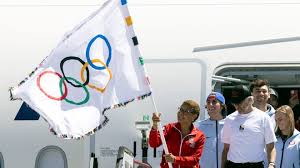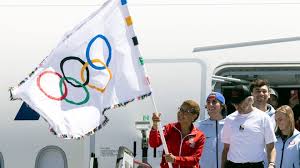
Table of Contents
The arrival of the Olympic flag in Los Angeles marks a significant milestone in the lead-up to the 2028 Summer Games. This ceremonial handover signals the official countdown to one of the world’s most prestigious sporting events and brings heightened expectations and responsibilities for the host city. As the excitement builds, so does the pressure on organizers to deliver a successful and memorable Games.
The Symbolic Handover
Ceremony Overview
The Olympic flag’s arrival in Los Angeles was celebrated with a grand ceremony, featuring:
- Flag Handover: The symbolic transfer of the Olympic flag from Paris, host of the 2024 Summer Games, to Los Angeles. This handover represents the passing of the Olympic torch and signifies the beginning of preparations for the next host city.
- Festivities and Speeches: The ceremony included speeches from key figures, including IOC President Thomas Bach, Los Angeles Mayor Karen Bass, and other prominent personalities, highlighting the significance of the event and the excitement for the upcoming Games.
- Cultural Performances: The event featured performances showcasing Los Angeles’ cultural diversity and creativity, providing a glimpse of what’s to come in 2028.
Meaning of the Handover
The arrival of the Olympic flag is more than just a ceremonial event; it signifies the official start of Los Angeles’ role as the next Olympic host. It serves as a reminder of the city’s commitment to delivering a world-class Games and sets the stage for the intense preparation and planning that lie ahead.
The Pressure on Los Angeles
Logistical and Organizational Challenges
With the flag’s arrival, the pressure on Los Angeles to deliver a successful Olympics is substantial. Key challenges include:
- Infrastructure Development: Ensuring that all venues, transportation systems, and accommodations are ready and meet international standards. This includes upgrading existing facilities and constructing new ones as needed.
- Security and Safety: Implementing comprehensive security measures to protect athletes, officials, and spectators while ensuring the safety and smooth operation of all events.
- Budget Management: Managing the budget effectively to avoid cost overruns and ensure financial sustainability. This includes securing funding and sponsorships while controlling expenses.
Public and Stakeholder Expectations
Los Angeles is under pressure to meet and exceed the expectations of various stakeholders:
- Public Sentiment: Engaging with local communities and addressing their concerns while fostering enthusiasm for the Games. This includes ensuring that the benefits of hosting the Olympics are felt across the city and addressing any potential negative impacts.
- International Attention: Meeting the high standards set by previous Olympic Games and ensuring that the event is conducted with excellence. This involves showcasing the city’s strengths and making a positive impression on a global audience.
Key Areas of Focus
Venues and Facilities
One of the primary areas of focus is the development and readiness of venues and facilities:
- Olympic Stadium and Arenas: Ensuring that the main stadium and various sports arenas are constructed or renovated to meet the needs of the Games and provide an outstanding experience for athletes and spectators.
- Athlete Villages: Preparing accommodations for athletes that offer comfort, functionality, and a positive environment.
Transportation and Logistics
Efficient transportation and logistics are crucial for the success of the Games:
- Public Transit: Enhancing public transportation systems to accommodate the influx of visitors and provide reliable service throughout the event.
- Traffic Management: Implementing measures to manage traffic flow and reduce congestion in key areas.
Community Engagement and Legacy
Engaging with the local community and planning for the legacy of the Games are essential components:
- Community Involvement: Involving local residents and organizations in the planning and execution of the Games to ensure broad-based support and participation.
- Legacy Planning: Developing plans to leverage the Games’ impact for long-term benefits, including infrastructure improvements, economic development, and community programs.
Preparing for the Spotlight
Global Media and Broadcast
The 2028 Games will attract global media attention, and Los Angeles must be prepared for:
- Media Relations: Coordinating with international media to ensure comprehensive coverage and positive representation of the city and the Games.
- Broadcasting: Providing high-quality broadcasting and streaming services to reach audiences worldwide.
Sponsorship and Revenue
Securing sponsorships and managing revenue streams are critical for financial success:
- Corporate Sponsorships: Attracting major sponsors to support the Games financially and enhance the overall experience.
- Ticket Sales: Managing ticket sales and distribution to ensure accessibility and maximize revenue.

Conclusion
The arrival of the Olympic flag in Los Angeles heralds the beginning of a new chapter in the city’s journey toward hosting the 2028 Summer Games. With significant pressure to deliver a world-class event, Los Angeles faces numerous challenges, from logistical and organizational issues to meeting the expectations of stakeholders and the global audience. As preparations intensify, the city must focus on effective planning, community engagement, and legacy building to ensure the Games are a resounding success and leave a lasting positive impact.







